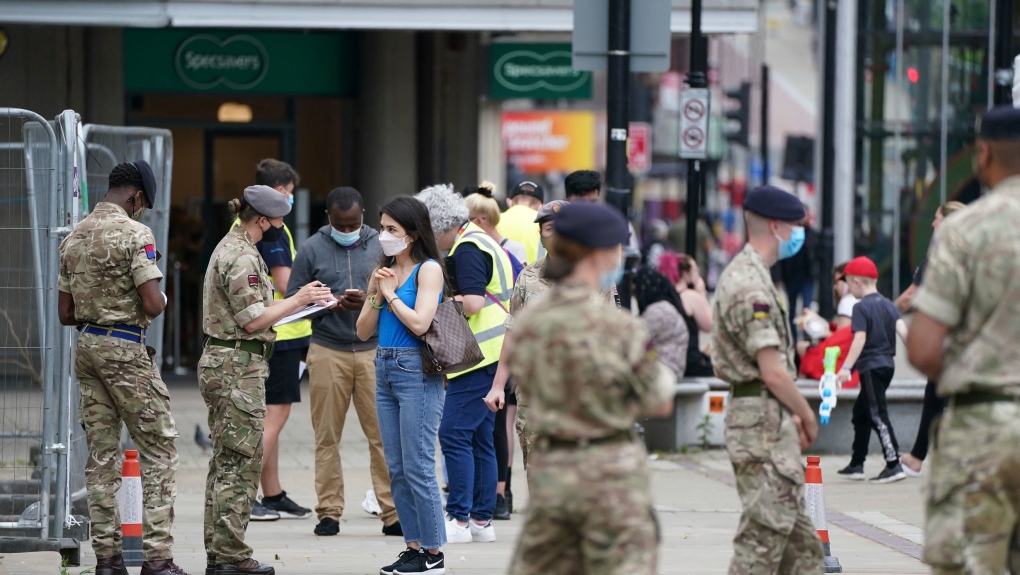Fourth wave or fear mongering? Alberta premier pans idea of Delta variant outbreak
 Despite more cases of the highly infectious Delta variant being discovered in Alberta in recent days, Premier Jason Kenney says his government's vaccine plan will be enough to combat any outbreaks of the strain.
Despite more cases of the highly infectious Delta variant being discovered in Alberta in recent days, Premier Jason Kenney says his government's vaccine plan will be enough to combat any outbreaks of the strain.
As some health experts are concerned over the increase in cases connected to the highly contagious Delta variant strain of COVID-19, Premier Jason Kenney is standing by the province's vaccination plan as a way to curb future cases of the disease.
Speaking to the media earlier this week, Kenney responded to a question about the new variant, which originated in India earlier this year and has recently been projected to be the dominant strain of the virus in many regions, including in Ontario.
Despite those facts, he dismissed the possibility of a fourth wave of COVID-19 cases based on the Delta variant.
"At this stage of this, I don't think it's responsible to constantly be spreading fear. We need to embrace the science of the protective effect of vaccines," he said.
He also referenced a U.K. study into vaccination that proved first and second doses provided a great deal of protection against the virus.
However, the country also announced it was delaying its plan to ease lockdown restrictions based on a startling increase in Delta variant.
The Delta variant first found in India is estimated by scientists advising the government to be between 40 per cent and 80 per cent more transmissible than the previous dominant strain. It now accounts for more than 90 per cent of infections in the U.K.
The variant has also more recently forced Australia's largest city, Sydney, into a two-week-long lockdown.
That was because an outbreak of the variant had reached 80 cases.
The move is in line with the Australian government's tough stance on health restrictions that have made it more successful at managing the pandemic than many other advanced economies.
The country has confronted small outbreaks in recent months that have been contained through speedy contact tracing, isolation of thousands of people at a time or snap hard lockdowns.
 Members of the Armed Forces speak to people, outside a mobile COVID-19 vaccination centre outside Bolton Town Hall, in Bolton, England, Wednesday, June 9, 2021, where case numbers of the Delta variant first identified in India have been relatively high. (Peter Byrne/PA via AP)
Members of the Armed Forces speak to people, outside a mobile COVID-19 vaccination centre outside Bolton Town Hall, in Bolton, England, Wednesday, June 9, 2021, where case numbers of the Delta variant first identified in India have been relatively high. (Peter Byrne/PA via AP)
When it comes to Alberta and the Delta variant, Kenney says his government has developed "one of the most cautious plans in the world."
"Yeah, we'll keep an eye on that and other variants," he said. "I guarantee you though, the promoters of fear will have lots of variants to come in the future. There will be new variants. They'll be more contagious. The scientists will study them. If necessary, the vaccines of the future will be adjusted to be more protective.
"The government of Alberta is following the expert advice of our chief medical officer instead of following angry voices on Twitter."
According to the province's data, the B.1.1.7 or U.K. variant is the dominant strain of the disease in Alberta.
From the latest data, up to the end of day on June 23, there are 607 confirmed cases of the B.1.617 India or Delta variant.
(With files from the Associated Press and Reuters)
CTVNews.ca Top Stories

'Mayday! Mayday! Mayday!': Details emerge in Boeing 737 incident at Montreal airport
New details suggest that there were communication issues between the pilots of a charter flight and the control tower at Montreal's Mirabel airport when a Boeing 737 made an emergency landing on Wednesday.
Trudeau appears unwilling to expand proposed rebate, despite pressure to include seniors
Prime Minister Justin Trudeau does not appear willing to budge on his plan to send a $250 rebate to 'hardworking Canadians,' despite pressure from the opposition to give the money to seniors and people who are not able to work.
Hit man offered $100,000 to kill Montreal crime reporter covering his trial
Political leaders and press freedom groups on Friday were left shell-shocked after Montreal news outlet La Presse revealed that a hit man had offered $100,000 to have one of its crime reporters assassinated.
Cucumbers sold in Ontario, other provinces recalled over possible salmonella contamination
A U.S. company is recalling cucumbers sold in Ontario and other Canadian provinces due to possible salmonella contamination.
Trudeau says no question incoming U.S. president Trump is serious on tariff threat
Prime Minister Justin Trudeau says incoming U.S. president Donald Trump's threats on tariffs should be taken seriously.
John Herdman resigns as head coach of Toronto FC
John Herdman, embroiled in the drone-spying scandal that has dogged Canada Soccer, has resigned as coach of Toronto FC.
Billboard apologizes to Taylor Swift for video snafu
Billboard put together a video of some of Swift’s achievements and used a clip from Kanye West’s music video for the song “Famous.”
In a shock offensive, insurgents breach Syria's largest city for the first time since 2016
Insurgents breached Syria's largest city Friday and clashed with government forces for the first time since 2016, according to a war monitor and fighters, in a surprise attack that sent residents fleeing and added fresh uncertainty to a region reeling from multiple wars.
Canada Bread owner sues Maple Leaf over alleged bread price-fixing
Canada Bread owner Grupo Bimbo is suing Maple Leaf Foods for more than $2 billion, saying it lied about the company's involvement in an alleged bread price-fixing conspiracy.

































